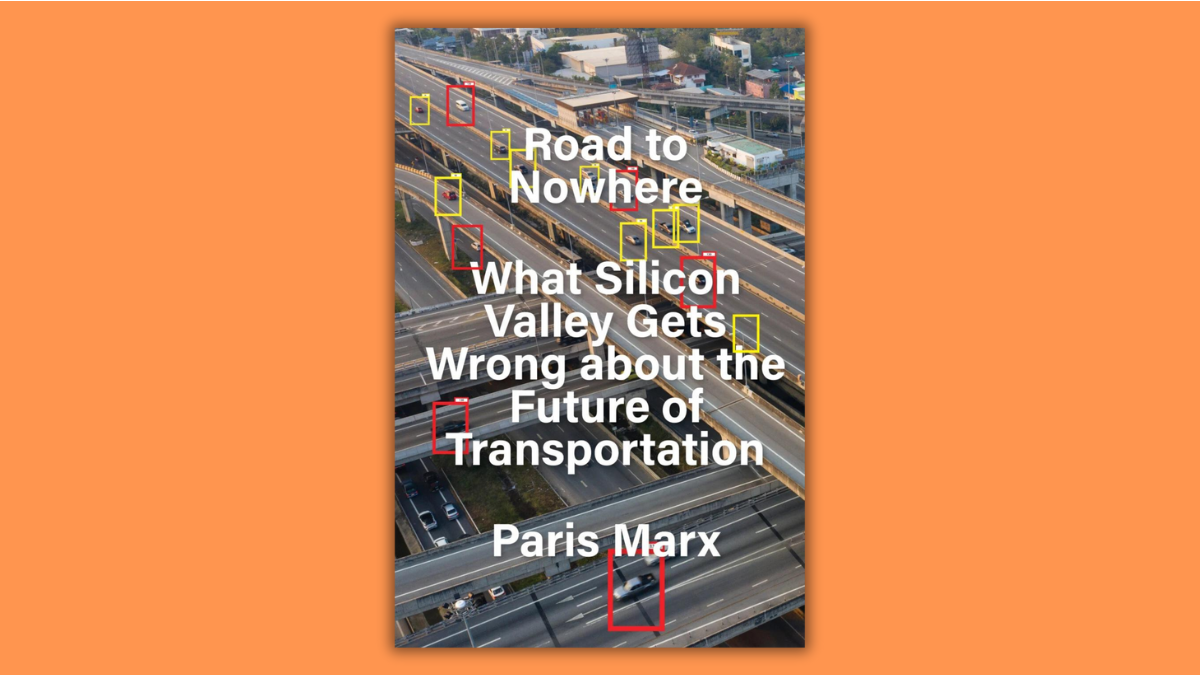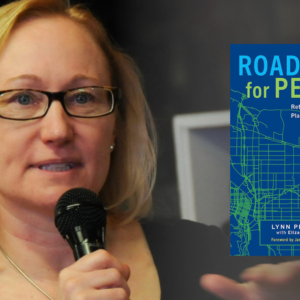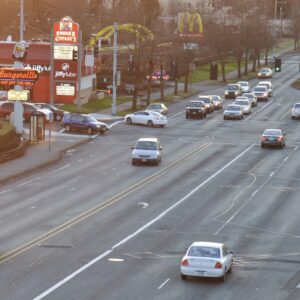Over the past 15 years, my brain has become like a Benson Bubbler, a lot of flow in and out, but not much retention.
That is what makes a book like Paris Marx’s Road to Nowhere: What Silicon Valley Gets Wrong about the Future of Transportation so useful. Surely I read about all this as it was happening, but the author’s clarity and framing brings today’s battle over who is allowed to benefit from a city into focus.
Marx’s contribution is to link the history of automobility in the 20th century to what we are living through now — Silicon Valley’s attempt to remake mobility for their profit.
The book begins with an engaging synopsis of how the car came to dominate US transportation. Its first chapter covers the same ground as Peter Norton’s Fighting Traffic: The Dawn of the Motor Age in the American City, but is shorter and less academic. Marx is a pleasure to read and has a gift for presenting a lot of material so smoothly that it never overwhelms the reader.
the meat of his book, that tech’s attempt to capture transportation perpetuates the problems of automobility, that it does not benefit average people, but rather remakes cities in a form appealing to Silicon Valley’s elite.
He notes that the bicycle and streetcar were early disruptors of urban transportation, and cites researchers John Falcocchio and Herbert Levinson regarding how new transportation technologies have tended to increase travel speeds. The researchers continue, “each time travel speed has increased, the amount of land used for urban growth has increased and population density has decreased.” This explains the fundamental connection between land use and transportation.
But it took the arrival of the automobile, and its mass-production, to alter cities in such a condensed time frame that it can be difficult for us to grasp.
From outrage to normalization
In 1908, there were 8,000 cars on the road. Twelve years later, by 1920, that number had increased by three orders of magnitude to 8 million. Congestion and carnage ensued and reformers pushed back hard.
Children were most vulnerable to the onslaught of cars, and urban residents reached for the language of war to express fury over their deaths. Mothers of children killed by cars were called white- or gold-star mothers, like those who had lost children in Europe. Bells tolled for the dead and lists of names were recited. It was widely publicized that in the four years following Armistice Day more Americans were killed in car crashes than “had died in the battle of France.”
A widespread campaign to restrict automobiles began—Cincinnati residents even pushed for an automatic speed limiter for cars!
If this all sounds a little bit like now, Marx argues that it is, except that mass death by car had yet to be normalized, “Today, if a pedestrian dies by venturing into the street, people often respond by questioning why they were there in the first place.”
In the face of calls for regulation, automakers realized that “the streets did not properly accommodate their product,” and the rest is history. Those set to profit from cars lobbied to redesign cities and succeeded. Pedestrians were restricted to sidewalks and crosswalks, the idea of a “jaywalker” was born.
The con
From that well-trodden history, Marx pivots to the meat of his book, that tech’s attempt to capture transportation perpetuates the problems of automobility, that it does not benefit average people, but rather remakes cities in a form appealing to Silicon Valley’s elite:
These new infrastructures promoted by Musk and Uber executives use egalitarian language to gain public support for a vision of mobility where the urban form and transport systems effectively stay the same, but wealthy people have new ways of paying to opt out of the problems that other residents have to experience every single day.
And in this well-researched and documented book he covers it all: autonomous cars, the 3-D transit system (tunnels and flying cars), electric vehicles, ride-sharing, and dockless micromobility (scooters, bikes). He also details the negative impact the existing services have had on workers, regulation, transit, and congestion. Their presence is not neutral.
Take autonomous cars. One criticism Marx has is that they don’t work, and that testing them has been dangerous. He recounts the cascade of errors and irresponsibility that led to the 2018 death of a woman crossing the street with a bicycle by one of Uber’s self-driving cars. The most shocking aspect of the story to me is the lack of regulatory scrutiny.
Of Uber, Marx writes,
The actions of Uber executives and engineers are in line with the “move fast and break things” culture that is promoted in Silicon Valley, one which is motivated first and foremost by beating competitors to market by launching a minimum viable product and capturing market share as quickly as possible in the pursuit of monopoly.
Unfortunately for all of us, this usually leaves regulators and cities several steps behind in a game of catch-up. But like the automotive interests on the 1920s, tech suggests that maybe the environment should change to better accommodate their products. Autonomous cars would function better if pedestrians wore beacons signaling their presence.
About those pedestrians, Marx’s take on dockless e-scooters shifted my thinking a little. In a chapter titled “The coming fight for the sidewalk,” he presents the encroachment of rental scooters and bikes on the sidewalk in light of the historic relegation of pedestrians to “thin strips” on the side of the road. He also pushes back against the idea that everyone who opposes change is a NIMBY:
The problem with framing the negative response to micromobility as a typical reaction by people who do not know better or simply oppose any and all change is that it ignores the power dynamics at play in the rollout of these services. Residents’ anger at the littering of scooters throughout their communities should instead be seen through the lens of the opposition to the automobile in the 1920s…
Marx ends the book by broadening his discussion beyond transportation to tech’s goal of a “frictionless” society, one in which people don’t get in the way of deliveries, and in which billionaires get their cut of every interaction. Think about that the next time you use Silicon Valley to mediate your food order.
All in all, this book is both a good introduction to transportation issues for someone new to them, and also time well spent for those already familiar with the subject. It is very well researched, with a lot of footnotes, and it is surprisingly easy to read. Marx is a good writer. I think I’ll be keeping this book next to my computer for handy reference.







Thanks for reading.
BikePortland has served this community with independent community journalism since 2005. We rely on subscriptions from readers like you to survive. Your financial support is vital in keeping this valuable resource alive and well.
Please subscribe today to strengthen and expand our work.
Well, you’re not a shabby writer yourself, at least when it comes to a book review on a topic you’re interested in.
This is the story of corporations. They’ve captured congress, most people can’t live w/o them b’cuz the provide the necessary essentials of life, housing, transportation, food, healthcare, etc.
I recently read a comment about cities not being designed for cars, but just bull dozed. Now I understand.
Thank you!
Thank you for this, I’ll be taking a look. Specifically, the stuff about the over-hyped techno solutions that from what I can tell don’t actually solve real problems. But I’ll be interested to read what they say about this.
Great article, really looking forward to reading the book.
Side note – I am pretty sure Paris Marx uses he/they pronouns
Thank you, and what a mess up with his sex! Of course Paris is male, Judgement of Paris and all. Damn. What threw me off is that the one Paris I personally know was a girl my son went to elementary school with. How embarrassing. Just a matter of losing a few “s”s.
Did you catch the NYT today? The AV that drove onto a bunch of wet cement? And I hear people are having sex in AVs and stopping them by putting orange cones on the hood. Makes you want to fly down to SF and join in on the fun.
There has been recent reporting on AVs running into emergency vehicles and slowing them down in SF. Does the book touch on how these companies avoid massive lawsuits? Hope I have chance to read it.
It doesn’t cover much about lawsuits that I remember, but it does talk about finance, venture capital and profitability. The companies are awash in money, burn through it rapidly, and from what I gather, consider death and other externalities just a cost of doing business.
What I didn’t talk about, and the book spent some time covering, was that tech doesn’t deliver on its promises to improve our transportation system. It is designed to work within a system of automobility and therefore doesn’t solve its problems.
Well, if the tech works, it will certainly solve some very vexing and stubborn problems, drunk driving and speeding among them. If the tech doesn’t work, then some investors lose some money, and otherwise we’re in the same hole we’re in today.
Are there any transportation technologies that could solve all our problems?
Hi Watts,
Marx does an admirable job of arguing that the tech “solutions” don’t leave us “in the same hole we’re in today,” rather, they make things a whole lot worse. I’ll just quote him, from a chapter titled “The Real Future that Tech is Building”:
He makes the case rigorously, with plenty of footnotes.
How does that case apply in this context? Are Waymo and Cruise (the two companies actively testing their tech in SF) pursuing a “predatory growth strategy”*? Are they attacking regulatory structures? It is my understanding that they are being regulated by multiple agencies, and that the companies are following the regulatory framework set out for them.
I think you could make the case that Uber and Airbnb did aggressively push back on regulations, but those are different companies doing different things (and are there really that many people who think the taxi medallion system did not deserve “attack”?)
Going back to my comment, I am arguing that if the tech succeeds, it will help solve some serious and intractable problems, and that if it fails, it will leave us no worse off than we are today; you are saying that even if it fails we will be worse off because of it.
If the tech succeeds and it is overly regulated, I could see some possibility that regulatory structures would be challenged, but not if it fails. And if it only marginally succeeds, for example, it mostly works but kills people at about the same rate human drivers do, I think the market will reject it whatever the regulators say.
But regardless, those are predictions about the future; in the present, the robot driving companies are not doing what they’re accused of.
PS For this critique to have any merit at all, “tech solutions” has to be more precisely defined. The covid vaccine was a “tech solution” as was GPS and modern wind turbines.
*Of course they are hoping their tech succeeds and is wildly successful, and presumably that makes it a “growth strategy”, but what makes it “predatory”?
A quick, short reply to your last two paragraphs–you just changed subjects on me! to biotech, a whole ‘nuther topic. Biology and molecular biology have been heavily supported for decades, half a century, by national governments (ours, European, Japanese …). What a switcharoo! Lets call it decades of supporting basic scientific research which has begun to pay off clinically over the past two decades. Biotech also attracts venture captital, but there is lots and lots of regulation, believe me.
“Tech” in the context of the book and the discussion refers to Silicon Valley computer tech (also based on decades of Fed gov basic research) and its incursion into our lives via cell phone.
The book also touches upon finance, growing inequality, and why there is so much capital venturing out to finance so many iffy endeavors. All that money looking for super-duper high returns.
I wasn’t trying to change topics, but rather to help gain clarity by what you meant by “tech”. Thank you for clarifying.
Biotech firms have also pushed hard against regulations, and are backed by big dollars, and look for huge returns while accepting high rates of failure, but they have less cultural visibility than the Silicon Valley does.
I am still curious why you think that attempting to develop self driving cars and failing at the effort will leave us better off than never having tried, which is what I took from your earlier comment.
Think of “tech” here in terms of that recent submarine implosion – and the developers who declared that it was all those pesky regulations and requirements that held back the Randian Prometheuses just waiting to shower their intellectual and profitable gifts upon us. Why should they have to have extensive/expensive research and testing for safety before unleashing their product? Why, the best real-world testing lab is out there already, free for the taking! Ask the cities for permission afterwards; they’ll give in. They always do.
For a while, PBOT seemed to think that a fleet of autonomous EVs would solve our parking/traffic woes, disregarding the fact that this fleet would either A) need to park somewhere while awaiting a demand or B) would be circling endlessly while waiting for a fare. Or both! Have we decided that the costs of resource-mining and electricity needed are a net boon to the planet vs. gas cars, or simply trading one problem for another?
I would love to have robocars that are cheap, safe and reliable (though I suspect you can only have 2 of those). You get there with extensive regulation and protocols. Sorry. Early airplanes were a free-for-all, and the FAA was created to both encourage AND ensure safe growth of that industry; autonomous vehicle fleets need the same setup, not “move fast (out of our way) and break things (that aren’t ours). “
Hi Watts,
I’m all for research, and working on a self-driving car is fine.
In the 1990s I worked with a group which was using neural nets to program a robot to grow a functioning insect brain, specifically how the bug interacted and learned from its environment. Not that far from an autonomous vehicle, but these were biologists and they were mainly interested in how a brain organizes itself. I’m not sure their research went anywhere, but it was sexy at the time.
What’s happening now is that neural net research has advanced enough that it can be commercialized. That means it is entering the realm of policy and regulation. Marx makes a policy argument that AVs don’t solve the transportation problems their promoters claim they will and will most likely make the problems of an automobile-based transportation system worse.
It’s a good book, give it a gander.
Our current death rate is a result of “the market” and its lack of regulation. It is not being rejected.
Lack of reason to massively sue?
Can’t wait for the “BikePortland is a socialist front” type folks to read that one 🙂
Joking aside, thanks for the book rec! I loved Norton’s Fighting Traffic, so will definitely be looking forward to a book that’s even sort of in that vein.
Marx was an anti-democratic authoritarian, not a socialist. He also painted his political theories as “scientific” despite the fact that they are, by definition, un-falsifiable.
Why are you bringing this up, something I can’t help but respond to? That is the most ahistorical read of Marx. Calling it anti-democratic is the most wildly wrong possible. In what way?
Actually, don’t reply. I just want to note that I’m disagreeing with your baseless claim with my own claim.
So maybe democracy was an end goal, but Marx didn’t think the revolution needed to be democratic. He was a means justify the ends kind of guy, and, as we’ve seen so many times in human history, most revolutionaries never seem to find quite the right moment to give their power back to the people.
It’s hard to make an omelet if you give too much power to the eggs.
https://en.wikipedia.org/wiki/Democracy_in_Marxism
Democracy isn’t just the end goal, it was the whole process. Calling the dictatorship of the proletariat undemocratic just belies a complete misunderstanding of words, along the lines of “nazis are socialists because the word socialist is in their name”. It’s nonsense (and you would get it if you read any of the page you linked to).
What we have now in Marxist thought is a dictatorship of the bourgeois, although those particular words weren’t used. Dictatorship just means who is in charge, and that includes who owns the means of production, who is your boss, etc. Under that definition, we don’t live in a very democratic society right now. We vote, sure. But the dictatorship of the proletariat is when the workers take over the means of production. That’s it. It’s more democratic than any society we have now.
As a lifelong socialist whose socialist family members were imprisoned and tortured by Marxists, in part, because they were democratic socialists, I have to laugh at being called a-historical. Marx’s was a fierce critic of existing democracy despite the fact that these democratic institutions came about via the blood, sweat, and tears of the working classes is utterly ahistorical. Google chartism and the reform acts of 1867, as one of many examples. Marx never bothered to flesh out what “communist” democracy would look like after the unitary communist party (vanguardism) replaced existing “bourgeoisie” democracy because he simply did not believe pluralistic democracy was necessary or good. Nor did he bother to flesh out how concentrating power in a single party structure is in any way compatible with giving workers rights or a voice.
1. Communist revolution by a hierarchical single party (vanguard).
2. ?
3. Democracy.
Well, I’m sure you have your reasons for thinking what you do, but you’re not immune to red scare propaganda. Some people just like to throw around the word “socialism” like a floating signifier, it doesn’t mean anything or it can mean whatever you want.
Vanguardism is from Leninism which is just one interpretation of Marxism. It’s not inherent to it, nor is it obviously a bad idea (seems kind of necessary to me). In fact, what they called vanguardism is essentially how every single revolution has ever happened.
This is not a useful critique. Of course he described what it would look like, but it didn’t come down to the impossible level of detail of actually writing out policy for an unknown distant future, an endeavor that would be a giant waste of time because of how many unknowns there would be.
But we’re just arguing about how many angels can dance on the head of a pin. If we ever get anywhere near overthrowing the bourgeois and worker control of the means of production, we can worry about which specific flavor of socialism you like.
And like clockwork, a mild form of the no true
scotsmansocialist fallacy.I’m a worker-owned coops, local councils, and loose confederation type of socialist — you know, the type of socialism for which the term was actually coined.
Yes, and that’s why I surrounded the term by parentheses.
Your definition of revolution leaves something to be desired — including the many non-reformist reforms won by those who sought liberty, emancipation, and syndicalism.
I didn’t define it there, now did I? You’re just looking for an argument for the sake of it.
I’m not going to discuss this with you, it is meaningless. Agree to disagree.
An excellent and well-researched book on the topic of weaponizing technology in the service of advancing car culture is Peter Norton’s Autonorama. It’s a sort of follow-up to his book Fighting Traffic, referenced in the review.
“The letter to Tesla Senior Legal Director Dinna Eskin orders the Austin, Texas, company to say why it installed the (Autopilot) software update and how it justifies which consumers got it.”
Elon is another Titanic-Bro, and we are all in the sub.